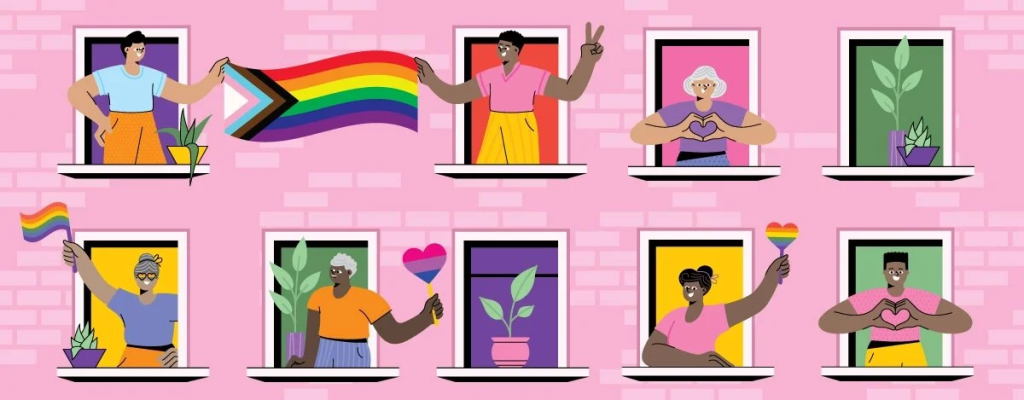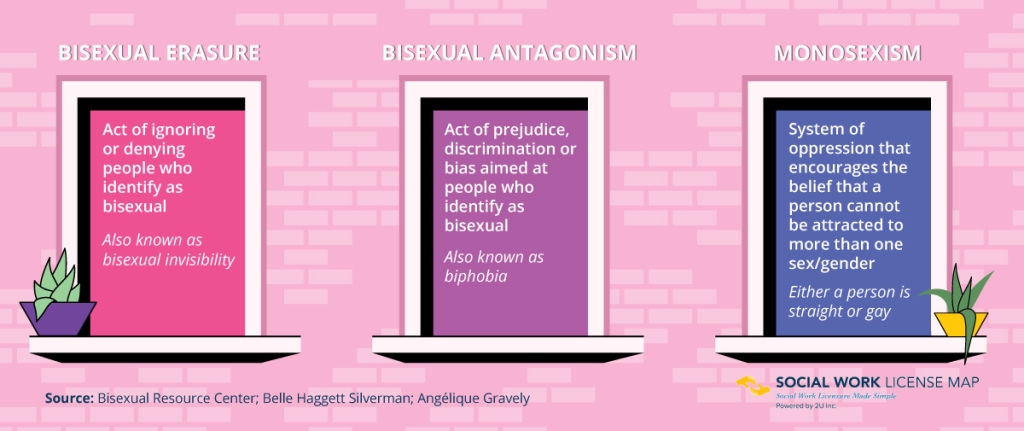How to Be an Ally to People Who Are Bisexual

The LGBTQ population is composed of people who fall on a variety of spectrums, including but not limited to gender and sexuality. Yet, even in a group that is characterized by inclusivity, a subset of that population can still feel marginalized. People who identify as bisexual, for example, sometimes encounter this marginalization in the form of bisexual erasure.
“They feel that they’re too queer to be understood by mainstream or straight communities, and they may not feel welcome in queer, LGBT communities,” said Belle Haggett Silverman, president of the board of directors at the Bisexual Resource Center (BRC) in Boston.
Despite feeling marginalized at times, people who identify as bisexual comprise 54.6% of the U.S. adult LGBT population, according to a 2020 Gallup survey on LGBT identification.
5.6%
of U.S adults identify as LGBT.
3.1%
of U.S adults identify as bisexual.
11.5%
of U.S. Generation Z adults identify as bisexual.
4.3%
of adult women identify as bisexual.
1.8%
of adult men identify as bisexual.
To explore the effects of bisexual erasure, SocialWorkLicenseMap.com asked experts how the problem can present itself and what allies can do to support people who are bisexual or bisexual-plus—an umbrella term to refer to anyone who is attracted to more than one gender and who identifies as bisexual, pansexual, fluid, queer, other labels or none at all.
What Is Bisexual Erasure?
“Bi erasure is exactly what it sounds like: when either the media or individuals disregard the bisexual experience and bisexual people as part of a community,” said Silverman, whose organization provides resources and support for the bi+ community.
Bisexual erasure is related to but not the same as bisexual antagonism, a more conspicuous or aggressive act of prejudice or discrimination.

Bisexual Erasure: Act of ignoring or denying people who identify as bisexual. Also known as bisexual invisibility.
Bisexual Antagonism: Act of prejudice, discrimination or bias aimed at people who identify as bisexual. Also known as biphobia.
Monosexism: System of oppression that encourages the belief that a person cannot be attracted to more than one sex/gender. Either a person is straight or gay.
Bisexual erasure and bisexual antagonism are the result of a society that emphasizes monosexism, said Angélique “Angel” Gravely, a bisexual educator and advocate in Philadelphia. Monosexism is a system of oppression that encourages the belief that a person is either straight or gay and cannot be attracted to more than one gender.
Gravely said bisexuals experience erasure in any environment where others believe that if monosexuality “is not your experience, then you aren’t deserving of space. You aren’t deserving of support.”
And bisexual erasure can happen in LGBTQ communities.
“LGBTQ spaces will often treat the ‘B’ as if it’s just there just for show,” Gravely said. She used the example of when an event is promoted for the LGBTQ community, and at the event, only gay and transgender people are acknowledged.
How Does Society Marginalize Bisexuals and What Are the Effects?
Bisexual erasure and bisexual antagonism can manifest in tandem.
“If somebody comes out as bi and they’re told: ‘That’s not a real thing. You’ll pick later in life,’ that is both bi erasure and bi antagonism. [You are] trying to tell somebody how they should feel and be,” Silverman said.
The “American Psychiatric Association Mental Health Facts for Bisexual Populations” guide notes this kind of pressure may contribute to bisexuals being more likely to hide their identity compared to gay men and lesbians, which can lead to anxiety, stress and other serious problems.
“Bi negativity—that biphobia and bi erasure—combine to invalidate bi people’s experiences and their sense of self and their sense of self-worth,” said Gravely, who is also a counselor.
While cultural identity affects an individual’s situation, Gravely and Silverman highlighted common experiences people who are bisexual may face that contribute to mental health problems, including:
- Encountering the false belief that bisexuality does not exist.
- Feeling a constant need to “come out” to people or explain bisexuality.
- Facing interpersonal issues related to the myth that bisexuals are untrustworthy.
- Encountering stereotypes that bisexuals are immoral or hedonistic.
- Experiencing emotional exhaustion caused by stigma and discrimination.
A 2017 report, “Bisexuality, Minority Health, and Stress,” found that people who are bisexual have an increased risk of mental health and substance use problems. Anxiety, depression and thoughts of suicide were reported to be higher in bisexuals than monosexuals across multiple studies, the report noted.
Silverman said there is little government funding provided to organizations like BRC to research people who are bisexual, which contributes to marginalization that can also lead to adverse physical, mental and economic outcomes for bisexual-plus people.
And Gravely lamented the lack of bi-specific education and support for adults who are struggling even in more affirming spaces.
How the LGBTQ Community Marginalizes Bisexual People
Bisexual erasure can happen in LGBTQ communities, particularly if the bisexual person is partnered monogamously with someone of a different gender.
Silverman used her own experience as an example: “There have been times where I’m not sure if I can bring my husband to an event and seem like I’m part of the community.”
Gravely encouraged LGBTQ communities to focus on three areas to promote inclusivity and raise visibility of people who identify as bisexual:
Language. In messaging, acknowledge members of the community who are bisexual. If events are open to all LGBTQ members, don’t single out one or two groups.
Programming. When planning activities and events, be sure to include bisexual people. If you are organizing support groups for lesbians, gay men and transgender people, plan a support group for bisexuals.
Funding. When preparing an annual budget, designate funds for studies, programming and other helpful resources specific to members who are bisexual just as you would fund programs specific to lesbians, gay men and transgender people.
Organizations That Support Bisexuals
People who want to be allies may consider engaging these organizations that provide learning resources and avenues to support the bisexual community.
American Institute of Bisexuality: AIB encourages, supports and assists research and education about bisexuality, including through funding and promotion.
The Bisexual Organizing Project: BOP serves bisexual, pansexual, fluid, queer and unlabeled (bi+) individuals and communities in the Upper Midwest with a yearly conference and regular events, such as a virtual book club.
The Bi+Youth Project: This Bi+ organization organizes, advocates and works to empower Bi+ Youth (ages 13-29) through talks, game nights and video projects to change the narrative about their community through storytelling and media representation.
Bisexual Resource Center: The BRC creates resources, provides support, and helps to build community for bi/pan/fluid people; it also provides a list of organizations in the United States and around the world.
Bi.Org: This AIB project serves as an online community with articles, essays and other content to support members of the bisexual community and to help families understand their loved one.
How to Support Bisexuals
“The most common thing that bisexual folks have said that they have experienced is that feeling of not having a place where they can be their whole selves and be welcome and accepted,” Silverman said.
For those wanting to be allies, she shared the BRC’s “How to be An Ally to a Bi+ Person” brochure. Tips include:
- Believe that bisexuals exist.
- Accept sexual identities without reservation.
- Respect relationships equally, whatever style they are.
- Speak out against bi antagonism and bi erasure in everyday life.
- Celebrate bi culture.
- Accept whatever label someone chooses.
- Read, learn and enagage bisexual individuals or resource centers.
- Remember that one person does not represent all.
Read the full brochure for expanded explanations of these tips.
With work, people who want to be allies to bi+ people can help to protect them from the bisexual negativity. Allies help in “taking some of the weight off bisexual people having to defend themselves,” Gravely said.
How Helping Professions Can Help Eliminate Bisexual Erasure
People who are bisexual-plus have unique needs from others in the LGBTQ community. And it’s important for professionals in helping professions like counseling and social work to understand that gay-affirmative work is not inherently bi-affirming, Gravely said.
“There’s this assumption that if you understand how to serve gay and lesbian people, you understand how to serve bi people, and that’s just not the case,” she said.
Gravely provided these strategies for those in the helping professions working with bisexuals:
Check your own biases. Recognize if you view things through the lens of monosexism so you can acknowledge any biases you may have about others’ sexuality.
Use affirming language. Respect that people may use different labels for their identity and ask them what they prefer to use in conversation.
Use inclusive language. Acknowledge bisexual-plus people instead of referring to just “gays” and/or “lesbians.” Be mindful of how phrases like “gay marriage” erase bisexual people who are in same-sex relationships and who are married.
Educate yourself. Learn about the bisexual-plus community and how the connections between identity, behavior and attraction can look different for people.
Educate others. Support bisexual-plus people by teaching their family members, coworkers and the community about bisexuality.
“Social workers are in a really good place to take on some of that educational work to help families learn that there are resources where they can learn more about bisexuality,” Gravely said.
Information on Social Work License Map is not intended to be a substitute for professional advice. Always consult qualified professionals with any questions you may have about mental and behavioral health issues.

